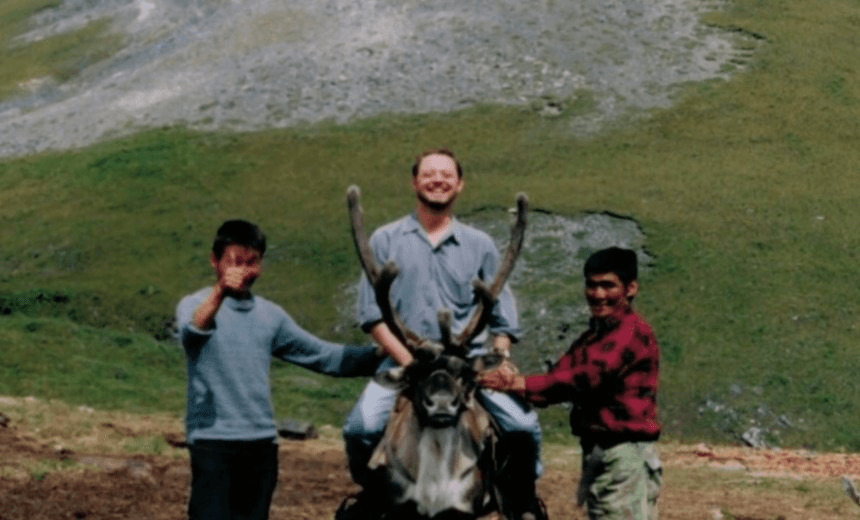Dan Kelly reviews Far and Away: Reporting on the Brink of Change, a collection of reportage by superstar US foreign correspondent Andrew Solomon.
The task undertaken by Andrew Solomon in Far And Away, a collection of travel writing and reportage spanning 25 years and some 23 countries, is more than the urge to document and bear witness. It also reflects Solomon’s hope that expressing difficult truths might be “a tool in the permanent project of fixing a broken world”.
The book is loosely chronological, following Solomon’s own career and its intersection with many of our age’s defining moments. Chapters include the fall of Soviet Russia, life in post-apartheid South Africa, climate change in Antarctica. Other datelines are from Rwanda, Myanmar, Brazil, and Gaddafi’s Libya.
All his writing is sharply rendered, as Solomon bears witness to international conflict. The world doesn’t become a better place. The optimism following the outing of the Taliban has crumbled into war, repression remains rife in Russia and China, Hutus and Tutsi still hate each other.
His assignments in Russia are concise, funny pieces, rich in the irony they document. There’s the one about going to Moscow to cover the reaction to the arrival of Sotheby’s and its international customers – a previously unthinkable meeting. He finds a group of Russian avant-garde artists, and is taken on a day trip out of the city to watch a performance piece that remains foreign, even after explanation. Slowly he comes to understand their art, not as something to be consumed, but as something to be done. There was “no room for the passive observer”; art in Soviet Russia was about solidarity, replete with hidden codes and obscure meaning.
This is lost on those there for the auction: “We know so little about this work we are buying – except that we know it’s worth buying.” As the auction progresses, the Russian artists grow increasingly confused. Torn from its context, art they consider elementary sells for extortionate prices; pieces that are revered in the community are sold for next to nothing.
Solomon’s reporting on various political oppressions and the struggle for autonomy sit side by side with accounts of chartered boat trips, food tours and private safaris. He takes a cruise in the Mediterranean, and receives painting lessons from a famous New York artist. He goes on an extended safari in Zambia. With each of these forays there’s a strong sense of what-the-hell-is-this-doing-here; the tone becomes somewhat self-congratulatory, and it’s all just so bourgeois. He has a guide, someone to carry his pack, an itinerary and no shortage of cash to cover emergencies – it’s travel, but not as most of us know it.
This luxury tourism is an uneasy fit with the other, serious pieces. The impression is that Solomon, having published essays across a number of highly regarded publications (the usual suspects: Harpers & Queens, New York Times Magazine, NPR,etc) then decides (or has it decided for him) that a collection is in order. His face goes on the cover and laudatory quotes go on the back (“positively Whitmanian”; “profoundly moving”), and the thing is shipped off to the printers.
Is that all there is to it? In the introduction we learn of the fear behind his wanderlust, his feelings of otherness and desire for escape – something credited to his then not yet explored sexuality: “I needed to break free of America for breathing space – not to be myself, yet, but to figure out what self I was becoming.” Later, he argues for the value of travel: how it acts as “a set of corrective lenses”, how it teaches you “to relate to disparate people with incongruent values”.
In one entertaining anecdote he is mistaken for an American cultural imperialist and punched in the face. Mostly though, he takes a back seat to the stories. He’s there as a reporter, not neutral exactly, but never really part of the story. It means the subjects of the story are left to speak for themselves, which is one of the book’s strengths. But I found myself wondering whether the book wasn’t something of a missed opportunity, a chance to go deeper into his own life. What was it like, being a gay man in Libya?
In some ways this is to ask for a different book. Solomon’s work stands on its own merits. Maybe a later collection will tell us not just what he thinks, but how he feels.
Far And Away: Reporting from the Brink of Change (Vintage, $40) by Dan Solomon

